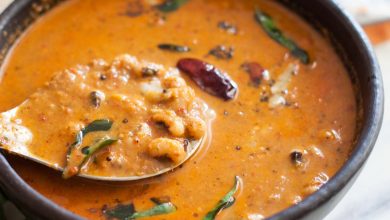Kadai Vegetable Sabzi Recipe (Mixed Vegetable Saute with Spices)
Transform your everyday vegetable medley into a flavor-packed, aromatic dish with this Kadai Vegetable Sabzi recipe. A North Indian classic, this dish combines a variety of fresh vegetables, warming spices, and a touch of kasuri methi (dried fenugreek leaves) to elevate the taste. It’s perfect as a side dish to complement any main meal or as a vegetarian delight on its own.
Ingredients
| Ingredient | Quantity |
|---|---|
| Cauliflower (Gobi), small florets | 200 grams (steamed) |
| Carrots (Gajjar), diced or sliced | 2 medium-sized |
| Green beans (French beans), cut into 1 inch pieces | 100 grams |
| Onion, diced | 1 large |
| Green bell pepper (Capsicum), diced | 1 medium |
| Garlic, grated | 3 cloves |
| Ginger, grated | 1-inch piece |
| Homemade tomato puree (or 2 large tomatoes, diced) | 1/2 cup |
| Cardamom powder (Elaichi) | 1 teaspoon |
| Turmeric powder (Haldi) | 1 teaspoon |
| Coriander powder (Dhania) | 1 teaspoon |
| Garam masala powder | 1/2 teaspoon |
| Red chili powder | 1 teaspoon |
| Kasuri methi (dried fenugreek leaves) | 1 tablespoon |
| Sunflower oil | For cooking |
| Butter | 1 tablespoon |
| Salt | To taste |
Preparation Time
Prep Time: 20 minutes
Cook Time: 30 minutes
Total Time: 50 minutes
Serving Size
This recipe serves 4 people.
Cuisine
This is a North Indian dish, perfect for those who love a rich, spiced vegetable side.
Diet
This dish is Vegetarian, ideal for those following a plant-based diet or simply looking to incorporate more vegetables into their meals.
Instructions
-
Steam the Vegetables:
Start by steaming the vegetables—carrots, green beans, and cauliflower. You can use a steamer or a pressure cooker for this step. If using a pressure cooker, add about 3 tablespoons of water and steam the vegetables on low for a few minutes. The vegetables should be tender yet slightly crisp, not overcooked. Once steamed, set them aside. -
Prepare the Base:
Heat 1 tablespoon of sunflower oil in a large kadai (wok) or a heavy-bottomed pan on medium-high heat. Add grated ginger and garlic to the pan and sauté until aromatic—about 30 seconds. -
Cook the Onions and Bell Peppers:
Add diced onions and diced green bell pepper (capsicum) to the pan. Stir-fry them together until the onions become translucent and the capsicum softens slightly but retains a bit of crispness. This should take about 4–5 minutes. -
Add the Tomato Puree and Spices:
Once the onions and peppers have softened to your liking, pour in the homemade tomato puree (or diced tomatoes). Stir in the cardamom powder, turmeric powder, coriander powder, garam masala powder, and red chili powder. Let the tomato mixture come to a quick boil and cook for 2–3 minutes, allowing the spices to blend with the tomato puree. -
Combine with Steamed Vegetables:
Now, add the steamed vegetables (carrots, green beans, and cauliflower) to the pan. Stir gently to coat the vegetables in the spiced tomato mixture. Taste and adjust the salt as needed. -
Add Kasuri Methi:
Sprinkle the kasuri methi (dried fenugreek leaves) into the mixture. This will add a delightful, aromatic flavor to the dish. Mix well and cover the pan. Reduce the heat to low and let the sabzi simmer for 3 to 5 minutes, allowing the flavors to meld together. -
Finish with Butter:
Stir in 1 tablespoon of butter to add richness to the dish. Let it melt and combine into the vegetables. -
Serve:
Once the sabzi is cooked and the flavors have infused, remove from heat. Transfer the Kadai Vegetable Sabzi to a serving platter and garnish if desired with fresh coriander leaves. This dish is now ready to be enjoyed as a side with your favorite Indian bread or rice.
Nutritional Information
(Approximate values per serving)
| Nutrient | Amount |
|---|---|
| Calories | 150 kcal |
| Protein | 3 grams |
| Carbohydrates | 20 grams |
| Fiber | 6 grams |
| Fat | 7 grams |
| Sodium | 200 mg |
| Sugar | 5 grams |
Tips for Best Results
- Steaming the vegetables helps preserve their nutrients and prevents them from becoming too soft. It also adds a nice texture to the dish.
- Customize the spice level: If you prefer a milder version, reduce the amount of red chili powder or skip the garam masala.
- Kasuri methi adds a distinct flavor to the sabzi. If you can’t find it, fresh fenugreek leaves can be used, though the flavor will be different.
- You can also add a squeeze of lemon juice just before serving for an extra burst of freshness.
This Kadai Vegetable Sabzi is a flavorful, healthy, and satisfying side dish that works beautifully with roti, paratha, or even rice. The combination of fresh vegetables and aromatic spices creates a comforting dish that’s packed with nutrition and flavor. Perfect for a family dinner or when entertaining guests, this sabzi brings the authentic taste of North India right to your table.




